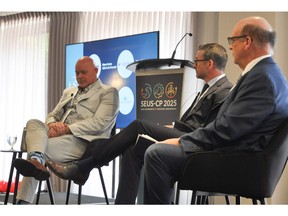Breadcrumb Trail Links
Business & EconomyNew BrunswickSaint John & SouthThe Issues
CEO of seafood giant believes Canada, U.S. need each other
 Robert Powell, of Crosby Liquid Bulk Terminal Limited, Chris McGuire, of Americold Logistics, and Glenn Cooke, of Cooke Aquaculture Inc. and the Cooke Inc. family of companies, participate in a recent food supply chain panel discussion held during the Southeastern United States-Canadian Provinces Conference in Saint John. Photo by Brice McVicar/Brunswick News
Robert Powell, of Crosby Liquid Bulk Terminal Limited, Chris McGuire, of Americold Logistics, and Glenn Cooke, of Cooke Aquaculture Inc. and the Cooke Inc. family of companies, participate in a recent food supply chain panel discussion held during the Southeastern United States-Canadian Provinces Conference in Saint John. Photo by Brice McVicar/Brunswick News
Article content
The head of a New Brunswick-headquartered global seafood giant is hoping for an end to the trade war between Canada and the United States in part for the sake of its cross-border integrated business model.
Advertisement 2
Article content
Cooke produces fishmeal and fish oil in the Gulf States, which is then brought to its Truro, N.S., plant to be processed into fish feed, according to Glenn Cooke, CEO of Cooke Aquaculture Inc. and the Cooke Inc. family of companies.
That fish feed is then transported into Maine to feed Cooke salmon, which will later be transferred into Canada for processing before the fish is shipped back to the United States.
As a result, Cooke said the current trade war has “made things more challenging” for his global business with an integrated value chain.
“The threat of tariffs is terrifying and on both sides,” Cooke said at a recent business conference held in Saint John. “Can you imagine we’re bringing fishmeal in from the Gulf and oil and then to be charged 25 per cent for a salmon diet to go back into feeding fish in Maine?
Article content
Advertisement 3
Article content
“That’s why I really believe we got to get back to what Canada and the United States is all about. We’ve been trading since forever. We have relatives on both sides of the borders, especially those rural areas like Maine and New Brunswick, and so we got to get closer.”
Prime Minister Mark Carney and U.S. President Donald Trump appear poised to sign a new trade deal following a recent meeting at the G7 Leaders’ Summit in Alberta.
This development comes after months of uncertainty for Canadian businesses who, in some cases, have been impacted by U.S. tariffs and Canadian counter-tariffs.
More than 240 business, government and economic development officials from both sides of the border recently gathered for the annual Southeastern United States-Canadian Provinces Conference held this year in Saint John.
Advertisement 4
Article content
Tariff talk was front and centre, with Premier Susan Holt meeting with Georgia Republican Gov. Brian Kemp and North Carolina Security of State Elaine Marshall to discuss the state of international relations.
“Do we want to become the 51st state? No, but do we want to become closer to the United States? I certainly do,” Cooke said during a panel discussion on the food supply chain.
“We should be closer on our defence, we should be closer on our immigration policies, we should be closer on all those types of things but remain independent.
“We need the U.S. and I think the U.S., in reality, needs us.”
Cooke Inc. is the world’s largest privately owned seafood company. Its global headquarters are in Saint John, but it recently completed a $50-million expansion of its processing plant in St. George and is tackling a salmon farm project in Bayside.
Advertisement 5
Article content
Recent tariff talks have forced local companies to “look internally and see how we can help each other out,” according to Robert Powell, vice-president of Crosby Liquid Bulk Terminal Limited.
The company operates a series of food-grade storage tanks on port lands on the city’s west side.
Powell participated in the panel discussion alongside Cooke and Chris McGuire, director of business development in Canada with Americold Logistics.
A recent rail spur project has opened the doors for more business opportunities for the liquid bulk terminal, Powell said, including the storage of fish oil products and other food products from third parties.
“We’ve done some collaboration with some local folks in our backyard – Moosehead being one of those with the Oland family and it’s been great – so that’s been a really neat transition for us,” he said.
Advertisement 6
Article content
A $100-million cold food storage facility will be going up near the terminal. It too is expected to play a significant role in the food supply chain.
Americold decided to build the plant in Saint John due in part to the port’s connection to three rail lines – CN, CPKC and CSX – as well as its partnership with DP World, McGuire said.
DP World operates Port Saint John’s growing container terminal.
“This is a real strategic hub for us,” McGuire said. “We see a lot of value not only in the investment that’s happened over the last number of years (at the port), but in the future growth that this port is going to bring to the area.”
Article content
Share this article in your social network
